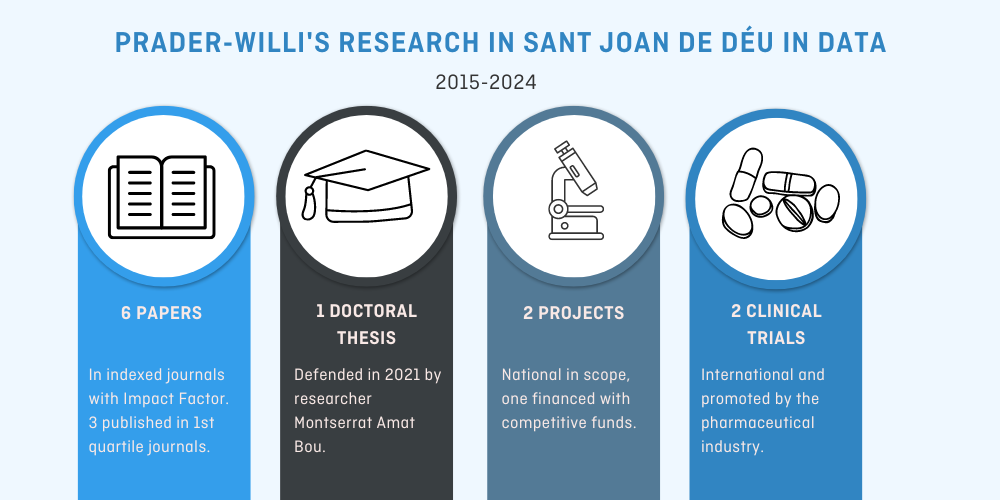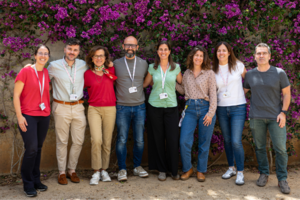Research into treatments to combat obesity and excessive sleepiness in children with Prader-Willi syndrome
Researchers from Sant Joan de Déu have promoted various research projects in recent years to advance the understanding of Prader-Willi syndrome and study new treatments for children affected by this rare disease, specifically to combat obesity and excessive daytime sleepiness in these patients.
Gut Microbiota and Prader-Willi Syndrome
Prader-Willi syndrome is associated with altered body composition, hyperphagia, and excessive weight gain. Introducing dietary restrictions from a very early age in affected children is crucial to prevent or delay the early onset of obesity, the main comorbidity factor in these patients.
In this context, a team of researchers from SJD Barcelona Children’s Hospital · Institut de Recerca Sant Joan de Déu conducted a study to identify the dietary components and gut microbiota closely related to weight gain in patients with Prader-Willi.
The authors recorded the diet of 31 children and adolescents diagnosed with this disease over four days, measured their adiposity, and analyzed fecal samples.
The results of these analyses, published in the journal Nutrients in April 2020, revealed that patients with Prader-Willi syndrome have a less diverse microbiota. They also found an association between high intake of saturated fats and meat, low fruit intake, and higher body mass index (BMI) and body fat mass standard deviation scores.
Based on these results, the authors suggest that modifying the diet by increasing fruit consumption and reducing meat intake may help control weight in these patients.
Reference paper: Garcia-Ribera S, Amat-Bou M, Clemente E, Lobe M, Chenoll E, Corripio R, Ibáñez L, Ramon-Krauel M, Lerin C. Specific Dietary Components and Gut Microbiota Composition are Associated with Obesity in Children and Adolescentes with Prader-Willi Síndrome. Nutrientes. 2020 Apr 11;12(4):1063. FI: 5.9.
Probiotics to Improve Metabolism in Patients with Prader-Willi Syndrome
The probiotic Bifidobacterium animalis lactis, part of the gut microbiota, improves central adiposity in obese adults. To evaluate if it has the same effect in children with Prader-Willi, a research team from the Institut de Recerca Sant Joan de Déu, led by Dr. Carles Lerin, conducted a randomized crossover trial among 39 patients with this disease.
The sample was divided into two groups. One group first received a 12-week treatment with Bifidobacterium animalis lactis, followed by a three-month break, and then a placebo for the same period. The other group underwent the reverse process: first receiving the placebo, taking a break, and then receiving the treatment.
The results showed that, while it did not modify total fat mass, it did reduce abdominal fat. It also improved fasting insulin concentration and insulin sensitivity. Additionally, the research team observed small improvements in some mental health symptoms in the patients.
Based on these results, they are now conducting another trial with a longer treatment period to determine if supplementation with this probiotic can provide a long-term therapeutic approach for children with Prader-Willi. As part of this trial, they are performing a detailed metabolomic study of participants using fecal and blood samples to conduct a complete genome analysis of the microbiome and try to identify associations between specific metabolites and some syndrome symptoms, such as hyperphagia.
Reference paper: Amat-Bou M, Garcia-Ribera S, Clemente E, Piquer-Garcia I, Corripio R, Sanchez-Infantes D, Villalta L, Elias M, Jiménez- Chillarón JC, Chenoll E, Ramón D, Ibáñez L, Ramón-Krauel M, Lerin C. Effects of Bifidobacterium animalis Subsp . lácteos (BPL1) Supplementation in Children and Adolescentes with Prader-Willi Syndrome: A Randomized Crossover Trial. Nutrientes. 2020 Oct 13;12(10):3123. FI: 5.9.
Study to Combat Excessive Daytime Sleepiness in Children with Prader-Willi
Some children with Prader-Willi syndrome experience excessive daytime sleepiness. A neurology team at Sant Joan de Déu Hospital is participating in a clinical trial to test the efficacy of a drug indicated for narcolepsy. The goal is to determine if it combats excessive sleepiness and, consequently, improves attention, mood, and cognition in these children. The study is led by Dr. Òscar Sans.


